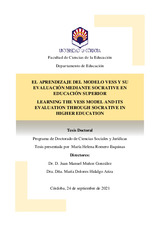El aprendizaje del modelo VESS y su evaluación mediante Socrative en Educación Superior
Learning the VESS model and its evaluation through Socrative in Higher Education
Autor
Romero-Esquinas, María Helena
Director/es
Muñoz González, Juan ManuelHidalgo Ariza, M. Dolores
Editor
Universidad de Córdoba, UCOPressFecha
2021Materia
Innovación pedagógicaEnseñanza-aprendizaje
Modelo VESS
Pensamiento
Aprendizaje cooperativo
Software Socrative
Formación docente
Educación superior
Neuroeducación
METS:
Mostrar el registro METSPREMIS:
Mostrar el registro PREMISMetadatos
Mostrar el registro completo del ítemResumen
Actualmente vivimos en la era de la inteligencia y de la turbotemporalidad, en la que la reflexión, la creatividad y el desarrollo de la emoción parecen aspectos relegados a un segundo plano en educación. Por ello, este trabajo trata de explicar cómo desde el modelo VESS -Vida Equilibrada con Sentido y Sabiduría- los docentes debemos transformar la educación y la sociedad, cambiando radicalmente la concepción primitiva que se tiene actualmente del proceso de enseñanza-aprendizaje, dotando de gran importancia al pensamiento como principal estrategia pedagógica en el aula. Por ello, este trabajo muestra dos estudios que tratan de demostrar o no, si el uso del método VESS, el aprendizaje cooperativo y Socrative como herramienta de evaluación es valorado entre los futuros docentes de forma positiva como medio de transformación educativa y social. Así, este trabajo trata de una investigación que parte del paradigma cuantitativo, donde se han elaborado dos instrumentos creados ad hoc llamados: Cuestionario sobre el aprendizaje del Modelo VESS en Educación Superior; y Cuestionario sobre las expectativas de uso del modelo VESS en su futura labor docente y su aplicabilidad en la sociedad. Los dos instrumentos han sido validados a través de varios análisis: correlacional, de consistencia interna – análisis factorial exploratorio- y de fiabilidad y validez del constructo – análisis factorial confirmatorio-. Los datos obtenidos a través de cada cuestionario han sido analizados a través de una serie de estudios estadísticos, descriptivos, inferenciales, de correlaciones bivariadas y de regresión. Los resultados obtenidos sostienen que los futuros docentes tienen unas buenas expectativas de uso acerca del modelo VESS, en combinación con el aprendizaje cooperativo en el aula, así como con el uso de Socrative como herramienta de autoevaluación. Además, coinciden en la importancia de este modelo para la transformación educativa y social, sosteniendo que con este método se refuerza el diálogo, la autoestima y el mantenimiento de sociedades democráticas y tolerantes. Nowadays, we live in the era of intelligence and turbotemporality, in which reflection, the creation and the development of emotion seem to be aspects relegated to the background in education. For this reason, this work tries to explain how, from the VESS model - Balanced Life with Meaning and Wisdom – teachers must transform education and society, radically changing the primitive conception that currently exists of the teachinglearning process, providing great importance of thinking as the main pedagogical strategy in the classroom. Therefore, this work shows two studies that try to demonstrate or not, if the use of the VESS method, cooperative learning and Socrative as an evaluation tool is valued among future teachers in a positive way as a means of educational and social transformation. Thus, this work deals with an investigation that starts from the quantitative paradigm, where two instruments have been created ad hoc called: Questionnaire on the expectations of use of the VESS model in their future teaching work and Questionnaire on how the implementation of the model influences VESS at the social level. The two instruments have been validated through various analyzes: correlational, internal consistency – exploratory factor analysis - and reliability and validity of the construct - confirmatory factor analysis. The data obtained through each questionnaire have been analyzed through a series of statistical, descriptive, inferential, bivariate correlation and regression studies. The results obtained maintain that future teachers have good expectations of using the VESS model, in combination with cooperative learning in the classroom, as well as with the use of Socrative as a self-assessment tool. In addition, they agree on the importance of this model for educational and social transformation, arguing that this model reinforces dialogue, self-esteem and the maintenance of democratic and tolerant societies.

